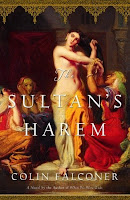
It would be hard for me to overstate how much I enjoyed the
Conqueror series by Conn Iggulden. It kept me engaged, launched Iggulden right to the top of my favorite authors, and prompted me to add several non-fiction books on the Khans to my "to read" list.
The five book series starts with
Genghis: Birth of an Empire. This book chronicles the childhood of Genghis Khan, born Temujin, who starts as a young boy with his family, expelled from his tribe after the death of his father and rises to be great khan, or gur-khan, of the Mongol nation.
Genghi's story continues in
Lords of the Bow, which follows his conquest of the Chin and Yenking. I had a little trouble with the jump between the first two books; I felt the transition from young Genghis to adult Genghis wasn't entirely smooth. However, this was a minor detail for me and I lost that feeling as the second book progressed. The sheer scope of what Genghis and his tumans accomplished is truly mind boggling, and Iggulden captures that feeling quite well.
The third book,
Bones of the Hills, continues Genghis's story and really features some interesting character development as we see Genghis struggled to make the transition from warload to ruler of a nation. He struggles with the lifestyle he has known and making the transition to ruler of cities, a life that doesn't entirely suit him. The transition in Genghi's story from the second book to this one was smoother for me, and really made for an interesting character study.
 |
Mural of seige warfare, Genghis Khan Exhibit,
|
The fourth book,
Empire of Silver, follows the transition of the title of great khan following Genghis's death and the struggles of the next ruler. I won't say who the next ruler is to avoid spoilers, but again Iggulden manages to create an interesting character study and to create a really interesting main character from a historical figure. I'll also add that I rarely cry when I read, but there was a scene in this one that got me, so kudos to Iggulden for that. If you read it, I think you'll spot it when you get there!
 |
| Map of the Mongol nation in 1259, from Columbia |
The series wraps up with
Conqueror, which covers the next few khans after the death of the second khan, including a brutal civil war. Overall, the series really creates a multi-dimensioned look at the Mongol horde, showing them as more than killing machines (although they are that). His characters are multi-faceted and interesting, and you find yourself rooting for them.
In addition to the pure interest of the story, the Mongols offer a great glimpse at a variety of areas and the world and a variety of cultures, which I really enjoyed. As we can see in the above map, the Mongols controlled a huge chunk of the world from Korea and China to Russia and Iran at their height. Columbia University has a useful page showing their spread, from which that map is borrowed,
here.
 |
Masyaf Castle, an assassin stronghold
in modern day Syria. Photo by Mewes. |
One of the cultures discussed in a few of the books that particularly caught my interest was that of the Isma'ili assassins of Alamut - I am definitely going to be doing some more reading about them. The assassins are a thorn in the side for the Mongols for a while; I won't spoil how it ends, other than to say I enjoyed the whole story arc.
 |
Tului With Queen Sorgaqtani by Rashid al-Din
|
The series also covers a regency by a woman, which was really revolutionary for the time and for that area of the world, which was interesting; I'd love to have seen a book focused around just that! Iggulden touches on that himself in the historical note to the last book, stating Sorghaghtani could easily have a book to herself. (That's a book I would love to read!) Stephanie Thornton has a book that discusses Sorghaghtani, among others, called
The Tiger Queens that I also recommend wholeheartedly.
Overall, this series had so much going for it. The books were fascinating and fun to read, and I tore through each of them. The historical notes at the end helped shed light on the historical accuracy (which seems to be high) and just wet my appetite for more about the Mongols.





















